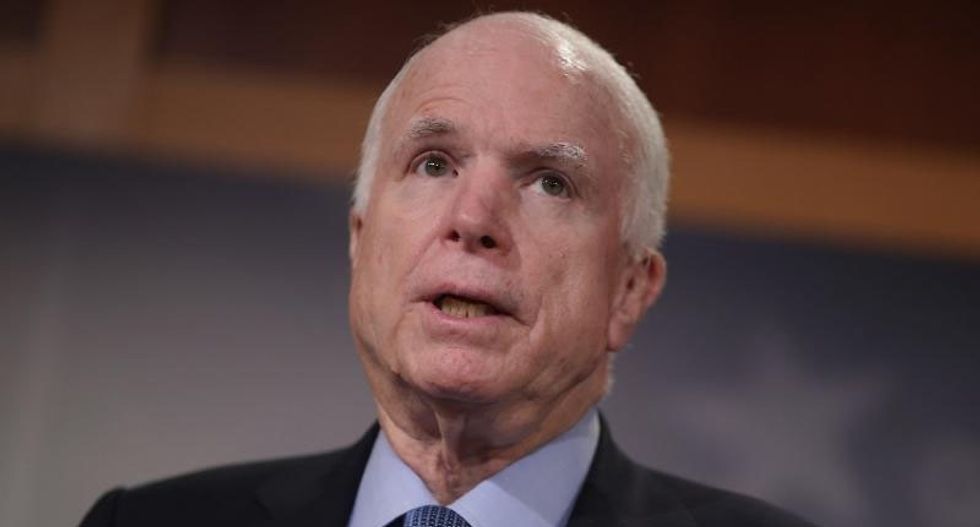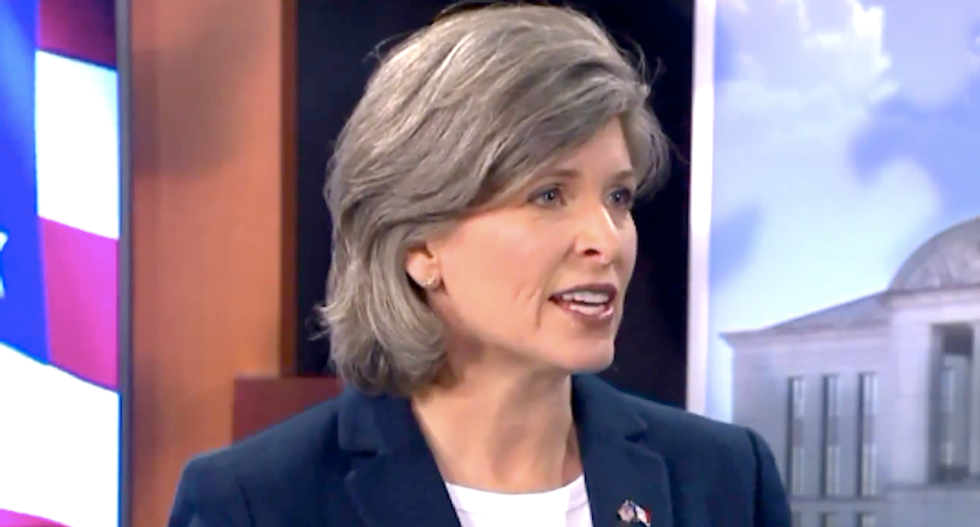Congress quietly drained hundreds of millions of dollars from a largely unused presidential campaign fund to provide a jolt of cash to the United States Secret Service and election security grants, Raw Story has confirmed.
The massive raid of the Presidential Election Campaign Fund was included late last week in Congress’ latest government funding package, which President Joe Biden signed into law.
Raw Story could not confirm which member, or members, of Congress are responsible for inserting language in the middle of the 1,012-page bill that tapped the fund to the tune of $375 million.
But the ramifications are clear: The Presidential Election Campaign Fund, which publicly funded White House aspirants’ campaigns from the 1970s to late 2000s, will now provide $320 million to the Secret Service and $55 million for election security grants as a part of the $1.2 trillion funding package that averted a partial government shutdown, according to a Raw Story review of legislation.
The $320 million will be directed to “operations and support” for the U.S. Secret Service, according to the legislation, which provided 11th-hour funding to major government departments through September.
RELATED ARTICLE: Unused government election fund brings in another $1.3 million
The Secret Service, which provides security for the president, vice president (and such candidates), along with foreign heads of state, can use the funds for a variety of purposes — from purchasing vehicles to overtime pay to travel accommodations. Former President Donald Trump, in particular, has refused to reimburse local law enforcement at his presidential campaign rallies, and the Secret Service has previously stated that it cannot reimburse municipal governments for these public safety costs because it hasn't received money from Congress to do so.
The Secret Service acknowledged questions sent by Raw Story, including those about how the agency would use its new funding windfall. But, it did not respond by the time of publication.
The $55 million designated for “election security grants” will be distributed to states within 45 days by the Election Assistance Commission to “improve the administration of elections for Federal office, including to enhance election technology and make election security improvements,” the bill said.
The Election Assistance Commission, a small federal agency that has faced threats by congressional Republicans to its very existence, has experienced drastically dwindling federal funds since 2018, according to Votebeat, who first reported on the use of the Presidential Election Campaign Fund for Help America Vote Act of 2002 (HAVA) grants given to states.
Benjamin Hovland, chairman of the Election Assistance Commission told Raw Story that federal funding for HAVA grants was $380 million in fiscal year 2018, $425 million in fiscal year 2020, $75 million in fiscal years 2022 and 2023, and now $55 million for fiscal year 2024.
“When you look at that number, that's less than we've seen in recent years, but I think that one of the things that is important about it is that it shows continued federal investment into election security and election administration,” Hovland told Raw Story in a phone interview. “We regularly hear from election administrators about the need for additional federal funds and then we hear about the need for consistent federal funds.”
The grants have been used by states to update voting equipment, create cybersecurity training programs, enhance physical security “to protect our election officials from physical threats” and to combat artificial intelligence disinformation, Hovland said.
The latest balance of the Presidential Election Campaign Fund was just over $404 million as of Feb. 28, according to figures from the U.S. Treasury. The Federal Election Commission has not approved matching funds for any 2024 presidential candidates, said Myles Martin, a spokesperson for the Federal Election Commission.
“The Commission will continue to evaluate submissions for either primary matching funds or general election funding for candidates who choose to apply for them, as well as continue to provide updates on the balance of the fund, which are received on a monthly basis from the Department of the Treasury,” Martin said.
The United States Treasury did not respond to Raw Story’s request for comment. The Treasury’s Bureau of the Fiscal Services acknowledged Raw Story’s questions but did not respond by the time of publication.
‘Modernized, not gutted’
Thank then-candidate Barack Obama for effectively rendering the Presidential Election Campaign Fund obsolete when he opted out of using it during the 2008 presidential election.
While the fund showered presidential candidates with public money, it also placed restrictions on how much they could raise overall — restrictions that Obama initially said he’d accept before changing his mind.
Obama’s Republican opponent, Sen. John McCain, accepted money from the fund. He was the last major party presidential nominee to do so.
 Sen. John McCain was the last major presidential candidate to take public matching funds from the Presidential Election Campaign Fund. (AFP Photo/Chip Somodevilla)
Sen. John McCain was the last major presidential candidate to take public matching funds from the Presidential Election Campaign Fund. (AFP Photo/Chip Somodevilla)
Since then, presidential candidates of any stature have largely declined public funding for their campaigns, whether during presidential primaries or general elections.
This is due in large part to the general loosening of campaign finance restriction during the past 15 years, including the Supreme Court’s 2010 ruling in Citizens United v. Federal Election Commission, which allowed corporations, unions and certain nonprofits to raise and spend unlimited amounts of money to advocate for or against candidates. It also gave rise to super PACs — political committees that may do the same.
The lack of use caused the Presidential Election Campaign Fund to balloon to $445.6 million last year.
For years, members of Congress, nonprofits and government watchdogs have called for campaign funding reform or reallocation of the Presidential Election Campaign Fund, which is fueled by cash from Americans selecting a voluntary $3 check-off box on their annual federal income tax forms.
The Presidential Election Campaign Fund had been “rotting on the vine due to the failure to update both the amounts and the timing of the grants” for at least a decade, said Ian Vandewalker, senior counsel for the Brennan Center’s Elections and Government Program.
ALSO READ: A neuroscientist reveals how Trump and Biden's cognitive impairments are different
“Major party candidates know that they can raise more money and have a better primary strategy without it,” Vandewalker said. “Nothing more needs to be done to kill it legislatively. What needs to be done is to have it updated to make it viable for major party candidates to use.”
Some government reform groups say decimating the Presidential Election Campaign Fund is the wrong move.
“While no major party presidential candidate has used it for a number of years, this system should be updated and modernized, not gutted,” said Aaron Scherb, senior director of legislative affairs at nonprofit government reform group Common Cause.
Scherb said Congress should reform the fund to meet the realities for campaign fundraising today, “not divert the money for other uses.”
“For taxpayers who check the box to have a small portion of their tax allocations go to the Presidential Election Campaign Fund, they did it specifically for this fund, not for some other reason,” he said.
As the government faces a $828 billion deficit and ongoing hyper-partisan battles threatening government shutdowns over the past year, it’s not surprising that the Presidential Election Campaign Fund got pulled into budget negotiations, Vandewalker said.
“It would be great if the presidential public financing funds were updated and made useful to candidates and used for its intended purpose,” Vandewalker said. “Obviously, it's understandable that as it's not getting used for its intended purpose, that it's going to be a ripe target in budgetary planning.”
Sen. Joni Ernst (R-IA) previously told Raw Story the Presidential Election Campaign Fund would be better used to close the nation’s budget gap.
“It's just sitting there … This is just a small effort on many other efforts that we have in trying to tackle this budget,” Ernst said in 2023. “You’ve just got to get out there and raise money if you're gonna play, so why do we do this?”
 Sen. Joni Ernst (R-IA) has advocated for a repurposing of Presidential Election Campaign Fund money. (WHO)
Sen. Joni Ernst (R-IA) has advocated for a repurposing of Presidential Election Campaign Fund money. (WHO)
Ernst did not respond to Raw Story’s request for comment.
Common Cause and the Brennan Center both support small-dollar donor match systems for funding presidential elections and the Freedom to Vote Act, which aims to curb partisan gerrymandering and the influence of big money in politics.
“Too often big and dark money calls the shots in politics,” Scherb said. “Certainly, money will always play a role in politics, but this Presidential Election Campaign fund kind of provides an alternative path to give more of a megaphone to nurses and teachers and firefighters in the political system to make sure that their voice can be heard at the presidential level.”
Another bill that’s stalled in Congress, the Empowering Mass Participation to Offset the Wealthy’s Electoral Role (EMPOWER) Act, would support a small donor match system and “revitalize presidential campaign public financing,” according to a February press release.
Sens. Chris Van Hollen (D-MD) and Ben Ray Luján (D-NM) reintroduced the bill alongside Rep. Ted Lieu (D-CA). None responded to Raw Story’s request for comment.
Rep. Tom Cole (R-OK) called for the complete elimination of the Presidential Election Campaign Fund in January 2023. He has sponsored the Strengthen the Pediatric Research Initiative Act, which if passed, would transfer the remaining funds into pediatric research.
Cole’s congressional office did not respond to Raw Story’s request for comment.
Sen. Amy Klobuchar (D-MN), who serves as chairwoman of the Senate Committee on Rules and Administration, which oversees federal elections, did not respond to Raw Story’s request for comment.
Prior to this month, the last expenditure from the Presidential Election Campaign Fund occurred in July, providing nearly $47.5 million to the National Institute of Health for the Gabriella Miller Kids First Research Act, a 10-year initiative funding pediatric research.
In 2014, Obama signed legislation that eliminated the use of the fund for national political party conventions, diverting the money that would have otherwise been used for that purpose toward research supporting childhood cancers and diseases.



 Sen. John McCain was the last major presidential candidate to take public matching funds from the Presidential Election Campaign Fund. (AFP Photo/Chip Somodevilla)
Sen. John McCain was the last major presidential candidate to take public matching funds from the Presidential Election Campaign Fund. (AFP Photo/Chip Somodevilla)
 Sen. Joni Ernst (R-IA) has advocated for a repurposing of Presidential Election Campaign Fund money. (WHO)
Sen. Joni Ernst (R-IA) has advocated for a repurposing of Presidential Election Campaign Fund money. (WHO)